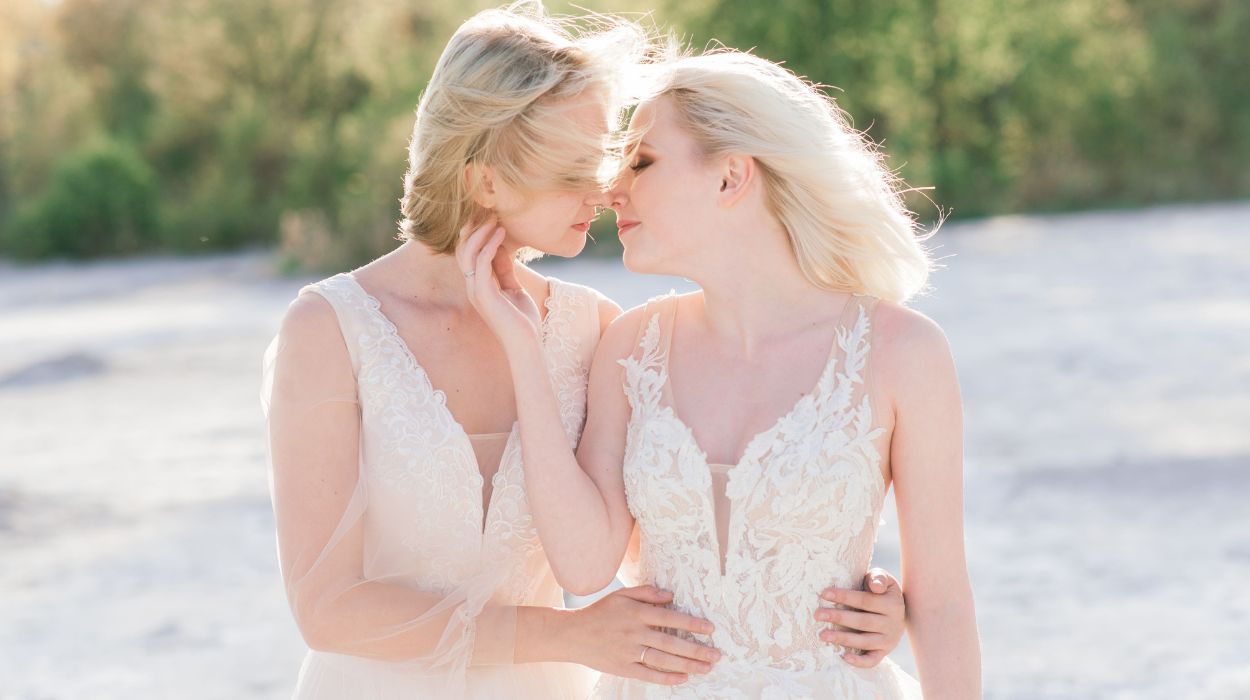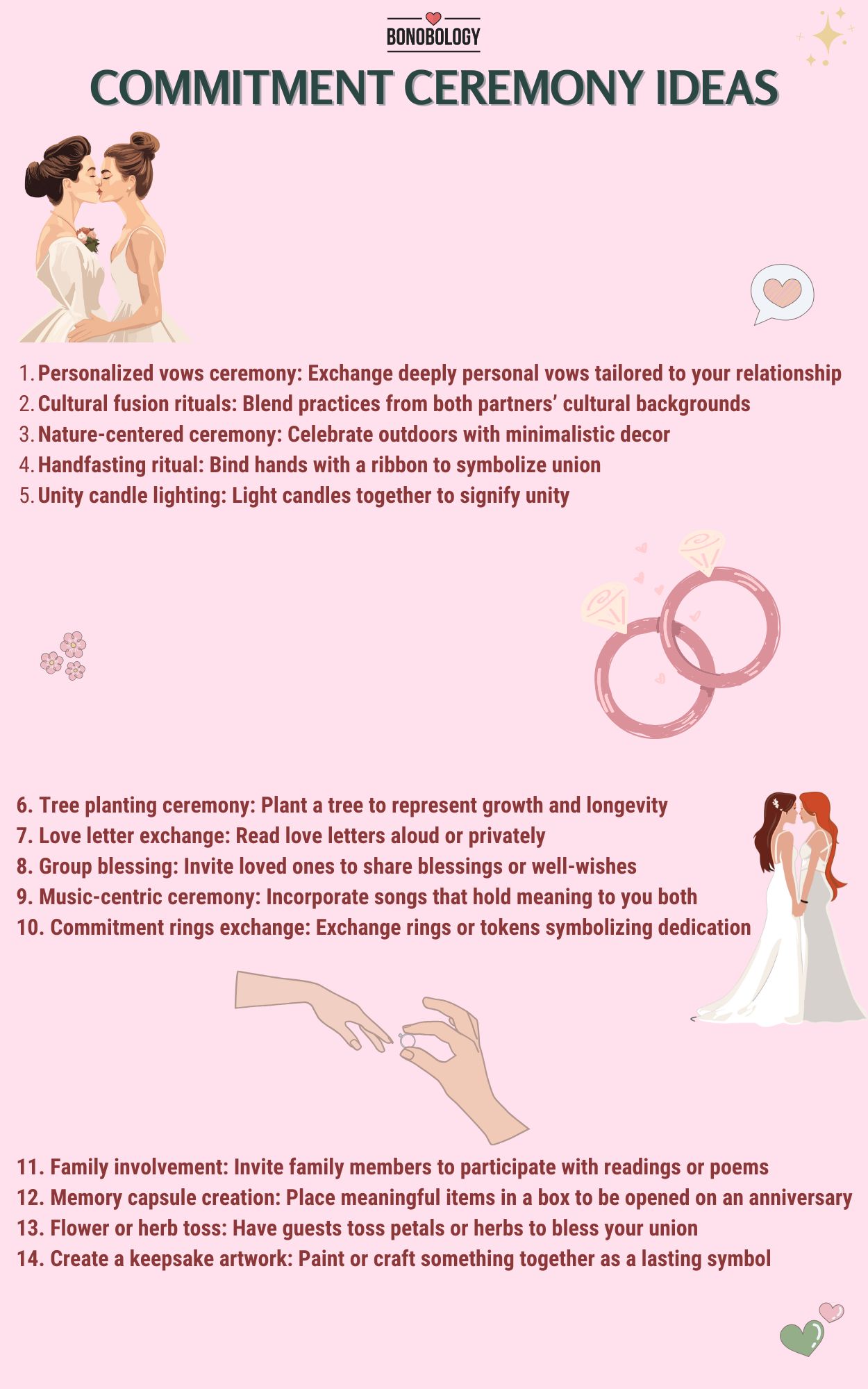Planning a commitment ceremony? Everything you need to know

Commitment ceremonies offer another option for couples who want to declare their fidelity without being legally bound. Unlike traditional weddings, commitment ceremonies center on personal vows and shared values rather than legal requirements, allowing the flexibility to create a unique, heartfelt celebration. If you’re considering this option, here’s a comprehensive guide to understanding and planning a commitment ceremony.
What is a commitment ceremony?
A commitment ceremony is a meaningful ceremony in which couples publicly affirm their love and devotion without a legal marriage contract. It is a non-legal marriage option in which a couple expresses their vows, often incorporating personal spiritual or cultural elements of their relationship. Couples may choose such a ceremony to celebrate their relationship for a variety of reasons, including spiritual beliefs, legal restrictions, or personal preferences.
So, what is a commitment ceremony? Essentially, it is about expressing commitment on its own terms, focusing on symbolism and emotional connection rather than legality. This type of ceremony is for those of you who are wondering, “Can you get married but not legally?” With a commitment ceremony, the answer is yes.
Commitment ceremonies have also been gaining traction in Hollywood lately as celebrity couples give up on legal marriage. Some famous couples who have chosen to have an engagement ceremony over the past decade include:
- Pop icon Lady Gaga and her partner Taylor Kinney
- Blood Diamond actors Djimon Hounsou and Kimora Lee Simmons
- Jennifer Aniston and Justin Theroux
- Beyoncé and Jay Z (Though They’re Already Married, They Renewed Their Vows with Commitment Ceremony
Commitment Ceremony vs. Wedding: Key Differences
If you are planning a symbolic union and are wondering “Commitment Ceremony vs. Wedding: Which is Right for Us?”, here is an overview. Both options allow couples to express love and devotion, but they serve very different purposes. A traditional wedding usually involves legal formalities, resulting in a legally recognized union. A commitment ceremony, on the other hand, is a more personal, non-legal form of marriage that celebrates an emotional bond without the binding force of a legal contract.
Related reading: The first year of marriage is so important | How to make it work
For those who wish to get married spiritually but not legally, a commitment ceremony provides the framework for a ceremony similar to a wedding, including the option to exchange rings, vows, and a reception, but without the legalities. Let’s dive into five key differences between an engagement ceremony and a traditional wedding.
- Legal status: A wedding creates a legally recognized union, while a commitment ceremony is an illegal marriage
- document: Weddings produce a government-issued marriage certificate; you can include a token Commitment Ceremony Certificate in your Commitment Ceremony, which is not legal
- Purpose: Commitment ceremonies focus on the emotional and spiritual relationship rather than legal recognition
- Legal interests: Couples who choose an engagement ceremony do not take advantage of the employment or tax benefits that come with legal marriage
- Insurance benefits: Unlike a traditional marriage, an illegal marriage does not make the couple eligible to share insurance benefits
Reasons to Choose a Commitment Ceremony Over a Wedding
Historically, commitment ceremonies were popular among LGBTQ+ or interracial couples who were not legally allowed to marry. Although the laws have now changed in most places, many couples still choose non-legal ceremonies for a variety of reasons. Some may want the freedom to express love outside of the legal framework, while others may be attracted to the intimate, flexible nature of a commitment ceremony.
A couple in their 30s who chose to have an engagement ceremony shared: “We believe marriage is the union of two souls. It is a very personal aspect of our lives and the government should not do anything about it. At least, that’s what we What I want.”
Increasingly, couples are prioritizing spiritual or personal connections over official status and are interested in how to get married without government involvement or simply prefer a vow ceremony. This illegal marriage method is also popular with couples who value inclusivity, sustainability or alternative lifestyles.

For others, a commitment ceremony feels more personal and authentic, giving them the freedom to design every aspect of their celebration. Here are five compelling reasons for couples to choose a commitment ceremony over a traditional wedding:
- Legal restrictions: In places where same-sex marriage is still not legally allowed, these couples may choose to hold a commitment ceremony to symbolize their union
- privacy: Couples who want to have a personal vow ceremony and stay away from legal scrutiny
- flexibility: Allows couples to design a unique ceremony that suits their personalities without the need for a government-imposed framework
- Belief system: Great for those who want a spiritual, illicit marriage
- Inclusiveness: Welcome diverse cultural and spiritual practices without restrictions
- Symbolic gestures: It’s about love and connection, not fulfilling legal obligations
Pros and Cons of Commitment Ceremonies
While commitment ceremonies are a beautiful way to celebrate love, they have unique benefits and limitations. This type of ceremony is effective for those who desire a personal, intimate relationship, but can present challenges for couples seeking legal rights or protection. By focusing on the vows and creative elements of a commitment ceremony, many couples find this way of celebrating both fulfilling and meaningful.
Related reading: How to Tell Someone You Just Want to Be Friends: 15 Examples
For those wondering “can you get married but not legally?” Commitment ceremonies give the answer in the affirmative, allowing couples to embody their bond without any formalities. However, both benefits and potential drawbacks must be considered, especially if you are planning for a long-term future with shared assets, insurance or inheritance planning. Here are some important pros and cons to help you weigh your options:
| advantage | shortcoming |
|---|---|
| Couples can create highly personalized commitment ceremonies | No legal protection of property or inheritance |
| They can just focus on the relationship without worrying about legal formalities | No legal rights such as tax benefits |
| Ideal for couples who want an illegal marriage consistent with their beliefs | Family or friends may not recognize the importance of the ceremony |
| Commitment ceremony vows are deeply personal and the experience is often more intimate | Insurance Limitations |
How to Plan a Commitment Ceremony
Planning a commitment ceremony allows for a highly personalized approach that a traditional wedding may not offer. It’s a journey of weaving together shared values, creating meaningful moments, and curating a celebration that reflects the unique nature of your relationship. Couples often find this approach valuable because of the freedom to include only the elements that resonate most. Whether you’re interested in commitment ceremony ideas that enhance your ceremony, or you’re just wondering how to get married without government involvement, here’s a step-by-step guide to help you create a beautiful, memorable ceremony:
- Define your vision: Decide whether the ceremony will be spiritual, symbolic, or thematic. Explore elements you would like to add to your wedding such as bridesmaids/groomsmen, label ideas, any traditional ceremonies and more.
- Select venue: Choose an environment that suits your preferences, whether it’s a beach, a garden or a cultural space. Or you can pursue something completely different, like my friend Alyssa did. She and her partner are both very adventurous people. So they decided to skydive as their commitment ceremony. They exchanged vows on the plane, kissed, and jumped off together. This is honestly the coolest couple I know!
- Prepare Commitment Ceremony Vows: Develop personal commitments that reflect the nature of your relationship
- Create a symbolic commitment ceremony certificate: Consider designing a certificate as a keepsake
- Choose clothing and decoration: Reflect your personality with clothing and decorations that complement your ceremony style
- Planning ceremony process: Arrange a schedule to include exchange of vows, readings, and any symbolic ceremonies
- Invite guests: Send invitations to friends and family who understand and support your choices
- Make arrangements to record this day: Hire a photographer or videographer to capture the moments
- Arrange a master of ceremonies or officiant: Some couples choose a spiritual leader or close friend to officiate the wedding
- Enjoy your day!

Infographic about commitment ceremony ideas
Planning a commitment ceremony opens up endless possibilities for creativity and personalization. From ceremonies rooted in ancient traditions to unique modern forms, commitment ceremony ideas can be as varied as the couple planning their wedding. This ceremony invites couples to celebrate their connection in ways that may not fit within the traditional wedding framework, creating an unforgettable day that is truly theirs.
To inspire your planning, here are some unique ideas for commitment ceremonies that embody the spirit of love and commitment:

Main points
- The commitment ceremony is a spiritual marriage, not a legal marriage
- Since it has no legal status, you will not receive a marriage license, tax benefits, or insurance benefits from a commitment ceremony
- If couples don’t want to get into any legal trouble or are looking for flexibility, they can choose to have a commitment ceremony
- Planning a commitment ceremony is similar to a wedding, except for the legal part, you can choose which traditional elements you want to keep and add new ones as needed
final thoughts
Commitment ceremonies offer an alternative to traditional weddings, celebrating love without the constraints of the law. Whether you are interested in exploring the concept of illicit marriage or not, a commitment ceremony offers endless possibilities for expressing and celebrating your unique connection.
Situations and relationships: Can one lead to the other?
How to Get Over a Crush: 17 Psychological Tips
How to text a girl for the first time: 15 tips and 75 examples
Your donation does not constitute a charitable donation. It will allow Bonobology to continue to bring you new and up-to-date information to help anyone in the world learn how to do anything.
Share feedback
Ask our experts
You must be logged in to ask a question.


 Anal Beads
Anal Beads Anal Vibrators
Anal Vibrators Butt Plugs
Butt Plugs Prostate Massagers
Prostate Massagers
 Alien Dildos
Alien Dildos Realistic Dildos
Realistic Dildos
 Kegel Exercisers & Balls
Kegel Exercisers & Balls Classic Vibrating Eggs
Classic Vibrating Eggs Remote Vibrating Eggs
Remote Vibrating Eggs Vibrating Bullets
Vibrating Bullets
 Bullet Vibrators
Bullet Vibrators Classic Vibrators
Classic Vibrators Clitoral Vibrators
Clitoral Vibrators G-Spot Vibrators
G-Spot Vibrators Massage Wand Vibrators
Massage Wand Vibrators Rabbit Vibrators
Rabbit Vibrators Remote Vibrators
Remote Vibrators
 Pocket Stroker & Pussy Masturbators
Pocket Stroker & Pussy Masturbators Vibrating Masturbators
Vibrating Masturbators
 Cock Rings
Cock Rings Penis Pumps
Penis Pumps
 Wearable Vibrators
Wearable Vibrators Blindfolds, Masks & Gags
Blindfolds, Masks & Gags Bondage Kits
Bondage Kits Bondage Wear & Fetish Clothing
Bondage Wear & Fetish Clothing Restraints & Handcuffs
Restraints & Handcuffs Sex Swings
Sex Swings Ticklers, Paddles & Whips
Ticklers, Paddles & Whips


















